
Staying hydrated is one of the most important aspects of maintaining a healthy body, and this is especially true for athletes. But hydration is not just crucial for athletes, it is vital for everyone, regardless of their level of physical activity.
In this article, we will explore the importance of hydration for athletes and non-athletes alike, and discuss the benefits of staying hydrated.
What is hydration?
Hydration refers to the process of supplying water to your body to maintain its fluid balance. The human body is made up of about 60% water, and every cell in the body requires water to function properly.
When you are dehydrated, your body does not have enough water to carry out its essential functions, and this can lead to a number of health problems.
Why is hydration important for athletes?
Athletes lose a lot of water through sweating during physical activity, and it is important for them to replenish this water in order to maintain their performance and prevent dehydration.
Dehydration can cause a range of symptoms, including fatigue, dizziness, and muscle cramps, all of which can have a negative impact on an athlete’s performance.
In addition to water, athletes also lose important electrolytes such as sodium, potassium, and magnesium through sweat. These electrolytes are essential for muscle function and hydration, and it is important for athletes to replenish them through sports drinks or other electrolyte-rich foods and beverages.
How much water should athletes drink?
The amount of water an athlete needs to drink depends on a number of factors, including their weight, the intensity of their activity, and the temperature and humidity of their environment.
As a general rule, athletes should aim to drink at least 8-10 cups (64-80 ounces) of water per day, and more if they are engaging in intense physical activity.
It is also important for athletes to listen to their bodies and drink water when they are thirsty. Thirst is the body’s way of telling us that we need to replenish our fluids, and athletes should not ignore this signal.
Why is hydration important for non-athletes?
While athletes may be more prone to dehydration due to their increased level of physical activity, non-athletes also need to stay hydrated in order to maintain their health. Dehydration can lead to a range of health problems, including headaches, fatigue, and constipation.
In addition, staying hydrated can help to boost cognitive function and improve mood. Studies have shown that even mild dehydration can impair cognitive performance, and that drinking water can help to improve memory, attention, and mood.
How much water should non-athletes drink?
Like athletes, the amount of water that non-athletes need to drink depends on a number of factors, including their weight, age, and gender. As a general rule, non-athletes should aim to drink at least 8 cups (64 ounces) of water per day, and more if they are in a hot or humid environment.
It is also important to note that other factors, such as alcohol consumption and certain medications, can increase the body’s need for water. If you are taking medication or consuming alcohol, it is important to drink extra water to ensure that your body remains hydrated.
What are some other ways to stay hydrated?
While drinking water is the best way to stay hydrated, there are other ways to increase your fluid intake.
- Eating water-rich fruits and vegetables, such as watermelon, cucumber, and lettuce, can help to increase your hydration levels.
- Sports drinks and electrolyte-rich beverages can be a good option for athletes who need to replenish their electrolytes after intense physical activity.
However, it is important to choose beverages that are low in sugar and high in electrolytes, as some sports drinks can be high in sugar and calories, which can be counterproductive to maintaining a healthy diet.
Another way to stay hydrated is to monitor your urine color. If your urine is pale yellow or clear, it is a good indication that you are properly hydrated. If your urine is dark yellow or amber in color, it may be a sign that you need to drink more water.
Don’t forget that you must also have a healthy diet. If you’re looking for a nutritious and delicious meal option to help maintain a balanced and healthy diet, consider trying out a recipe like curry risotto baked salmon. You can see the recipe at this link https://riceselect.com/recipe/curry-risotto-baked-salmon.
Lastly, it is important to avoid drinks that can dehydrate the body, such as alcohol and caffeinated beverages. These drinks can actually increase fluid loss in the body and lead to dehydration.
The benefits of staying hydrated
Staying hydrated has numerous benefits for both athletes and non-athletes. Some of the key benefits of staying hydrated include:
- Improved performance: Proper hydration can improve athletic performance and help athletes to maintain their energy levels during physical activity.
- Reduced risk of injury: Staying hydrated can help to prevent muscle cramps and other injuries that can occur when the body is dehydrated.
- Improved cognitive function: Drinking water can help to improve cognitive function and boost memory, attention, and mood.
- Better digestion: Staying hydrated can help to prevent constipation and improve overall digestion.
- Healthier skin: Proper hydration can help to improve skin health and prevent dryness and other skin problems.
In conclusion, staying hydrated is important for both athletes and non-athletes alike. It is important to drink enough water to maintain proper fluid balance in the body, and to replenish electrolytes lost through sweat during physical activity.
Try to follow all our recommendations for hydration and nutrition. Also, visit your nutritionist regularly so that he or she can monitor your state of health.
Leave a Reply